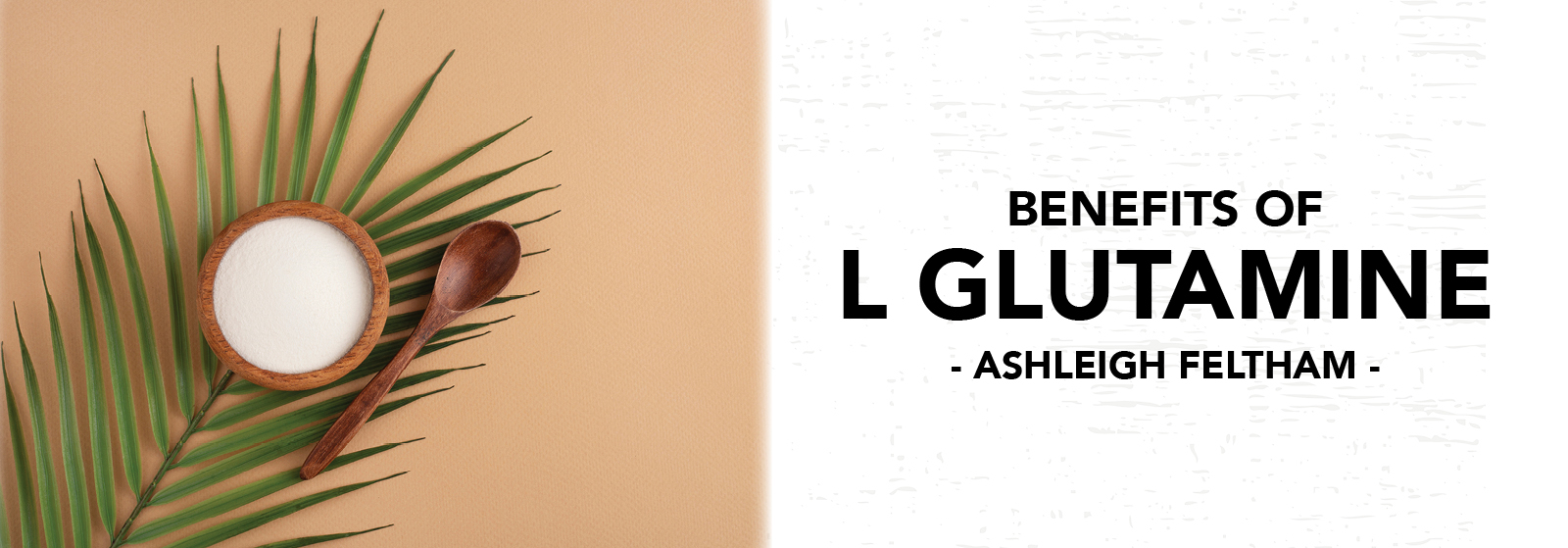You would be forgiven if you have no idea what L glutamine is or what it does. This blog is your go-to guide on everything you need to know about L glutamine.
Firstly, L glutamine is an amino acid, this is a building block of what makes up protein. L glutamine is the most abundant type of amino acid in your body (Xi P et al. 2011). There are two different molecular arrangements of this amino acid called L glutamine and D glutamine. L glutamine is the form of glutamine found in foods. (Durani S et al. 2008)
This amino acid makes up more than 40% of the amino acids in your muscle and over 20% in the free amino acid pool in your plasma. (Bergstrom J et al. 1974) It is classed as a conditionally essential amino acid. This means that in certain conditions of critical illness, infections, traumas, surgeries, sepsis, cancer, and in pre-term infants, this amino acid needs to be obtained from your diet (Durante W, 2019).
L glutamine plays many important roles including:
- Protein turnover
The protein in your body is continually replaced and this is why including enough and all of the essential amino acids in your diet each day is important. Essential amino acids are the type of amino acids that your body cannot make by itself.
- Antioxidant capabilities
Your body is exposed to free radicals and oxidative stress simply by being alive. The free radicals can become damaging to your body if the number becomes high. This is why including foods which have antioxidant capacities is important. You may be aware that fruits and vegetables contain antioxidants, but it may surprise you that an amino acid also has this role. L glutamine can form the antioxidant called glutathione.
- Metabolism of Nutrients
For your body to metabolise food it needs several factors including enzymes. L glutamine plays a role in making sure the nutrients you eat can be absorbed properly in your body.
- Optimising Immune System Function
When it comes to having an optimal immune system function you may have heard of the importance of vitamins like vitamin C, D, and A as well as minerals like zinc. L glutamine also helps to make sure that this important system is functioning optimally.
The immune cells of your body such as lymphocytes, neutrophils, and macrophages use L glutamine as fuel when your body is under critical stress. This could include during recovery from burns or after surgery, as well as in states of malnutrition. It may interest you to know that this state of critical stress is seen during high intensity exercise (Newsholme P et al. 2001 & Cruzat V.F et al. 2014).
This is one reason why those who are exercising at high levels and volumes of exercise may benefit from taking L glutamine as a supplement, as part of an overall balanced diet, to restore and promote optimal immune functioning.
- Acid-Base Balance
The acid base level or pH of your body lies between 7.35-7.45 (website). Any alterations from this level can potentially be fatal. L glutamine supports your liver to function optimally and allow the important role of maintaining pH balance to be maintained (Cruzat V et al. 2018)
- Gene Expression
Gene expression is the process when the genes which have codes for certain proteins are made into certain proteins with specific functions. This is another impressive role L glutamine helps to play a role in making sure that this process is successful and without error.
Take home message: For the majority, achieving enough protein from a varied and balanced diet will help you to meet your L glutamine needs. If, however you are in a state of critical illness, or other specific conditions such as post-surgery or exercising at a higher intensity and volume you may wish to add a L glutamine supplement. By including L glutamine as an additional supplement to an overall balanced diet, this may help to support recovery and help to maintain the functioning of an optimal immune system.
References:
- Xi P, Jiang Z, Zheng C, Lin Y, Wu G. Regulation of protein metabolism by glutamine: implications for nutrition and health. Front Biosci (Landmark Ed). 2011 Jan 1;16(2):578-97. doi: 10.2741/3707. PMID: 21196190.
- pH in the Human Body. News Medical Life Sciences. https://www.news-medical.net/health/pH-in-the-Human-Body.aspx
- Durante W. The Emerging Role of l-Glutamine in Cardiovascular Health and Disease. Nutrients. 2019 Sep 4;11(9):2092. doi: 10.3390/nu11092092. PMID: 31487814; PMCID: PMC6769761.
- Bergstrom J, Furst P, Noree LO, Vinnars E. Intracellular free amino acid concentration in human muscle tissue. J Appl Physiol. 1974;36:693–7.
- Newsholme P. Why is l-glutamine metabolism important to cells of the immune system in health, postinjury, surgery or infection? J. Nutr. 2001;131:2514S–2523S. doi: 10.1093/jn/131.9.2515S.
- Cruzat V.F., Krause M., Newsholme P. Amino acid supplementation and impact on immune function in the context of exercise. J. Int. Soc. Sports Nutr. 2014;11:61. doi: 10.1186/s12970-014-0061-8.
- Cruzat V, Macedo Rogero M, Noel Keane K, Curi R, Newsholme P. Glutamine: Metabolism and Immune Function, Supplementation and Clinical Translation. Nutrients. 2018 Oct 23;10(11):1564. doi: 10.3390/nu10111564. PMID: 30360490; PMCID: PMC6266414.
- Durani S. Protein design with L- and D-alpha-amino acid structures as the alphabet. Acc Chem Res. 2008 Oct;41(10):1301-8. doi: 10.1021/ar700265t. Epub 2008 Jul 22. PMID: 18642934.




